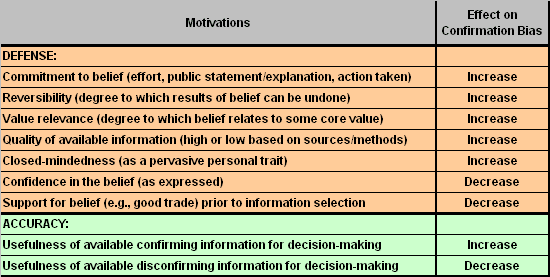
| Confirmation Bias Definition | Investopedia | |
A psychological phenomenon that explains why people tend to seek out information that confirms their existing opinions and overlook or ignore information that refutes their beliefs. Confirmation bias occurs when people filter out potentially useful facts and opinions that don’t coincide with their preconceived notions. It affects perceptions and decision making in all aspects of our lives and can cause us to make less-than-optimal choices. Seeking out people and publications with different opinions than our own can help us overcome confirmation bias and make better-informed decisions.FEATURE ARTICLE: CONFIRMATION BIAS IN THE INTERNET AGEPosted by: Angeladu | | December 19, 2011
Confirmation Bias refers to “a type of selective thinking whereby one tends to notice and look for what confirms ones beliefs, and to ignore, not look for, or undervalue the relevance of what contradicts ones’ beliefs. Numerous studies have demonstrated that people generally give an excessive amount of value to confirmatory information, that is, to positive or supportive data”.
|
The Internet is the greatest detractor to serious thinking since the invention of television”.
- Leo Chalupa, Neurobiologist, University of California, Davis
Is the Internet Changing the Way You think? The Net’s Impact on Our Minds andFuture. Edited by John Brokman. (New York: Harper Perennial, 2011).
Internet has already become an inevitable part of our life. I think the best advantage that we take from the internet is efficiency. The internet saves us a lot of time in finding things. Say a student wants to write an essay about earthquake. She opens Google.com and types in the word earthquake. Less than one second, the internet offers her 167,000,000 results that relate to the earthquake topic. Then, what happens next? Click, click, click… She gets what she wants by simply controlling her mouse instead of spending hours in a library. I believe most of us have the same experience in our life. It is just so convenient that we search whatever we want to know on the internet. However, my question is do you take whatever appears on the internet for granted? or, do you judge the credibility of any arguments made on the internet?
--
And another one of the big problems that we are facing is something called "normalcy bias". The following is how Wikipedia defines it...
The normalcy bias, or normality bias, refers to a mental state people enter when facing a disaster. It causes people to underestimate both the possibility of a disaster occurring and its possible effects. This often results in situations where people fail to adequately prepare for a disaster, and on a larger scale, the failure of governments to include the populace in its disaster preparations. The assumption that is made in the case of the normalcy bias is that since a disaster never has occurred then it never will occur. It also results in the inability of people to cope with a disaster once it occurs. People with a normalcy bias have difficulties reacting to something they have not experienced before. People also tend to interpret warnings in the most optimistic way possible, seizing on any ambiguities to infer a less serious situation.





No comments:
Post a Comment